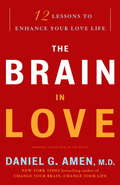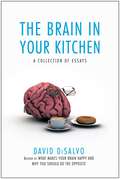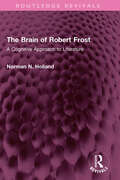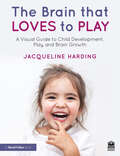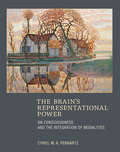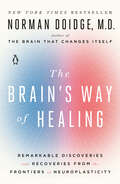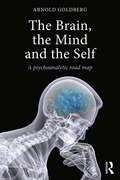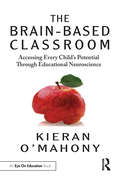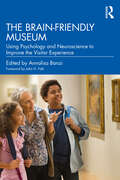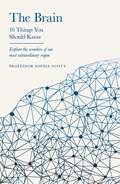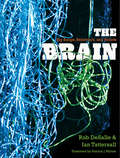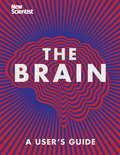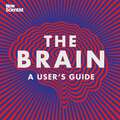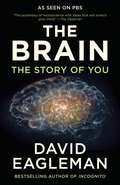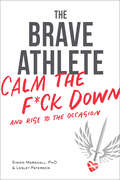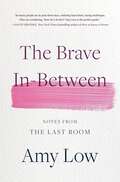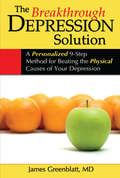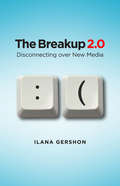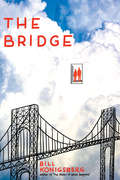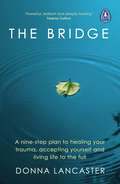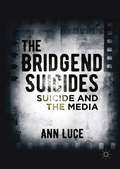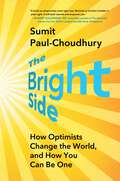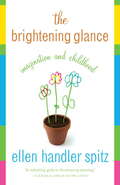- Table View
- List View
The Brain in Love: 12 Lessons to Enhance Your Love Life
by Daniel G. AmenYou hold the key to stronger relationships, deeper connections, and heightened intimacy.Everyone wants to know how to improve his or her love life, but so few of us understand the integral role the brain plays in attraction, keeping us excited about our partner, and helping us feel a strong connection. Based on Dr. Daniel Amen's cutting-edge neuroscience research, The Brain in Love shares twelve lessons that help you enhance your love life through understanding and improving brain function. Filled with practical suggestions and information on how to have lasting and more fulfilling relationships, The Brain in Love reveals:* How emotional and physical intimacy can help prevent heart disease, improve memory, stave off cancer, and boost your immune system* How the differences between men's and women's brains affect our perceptions and interest in sex * The science behind why breakups hurt so much, and what you can do to ease the pain* Surefire techniques to fix common problems-depression, PMS, ADD-that contribute to conflicts* How to make yourself unforgettable to your partnerThe Brain in Love explains everything there is to know about the brain in love and lust, guiding you to the emotional and physical intimacy you need.From the Trade Paperback edition.
The Brain in Your Kitchen: A Collection of Essays on How What We Buy, Eat, and Experience Affects Our Brains
by David DisalvoEvery day, we're faced with choices about what to eat, wear, and purchase. Blinded by a tsunami of information—some good, some bad, some intentionally misleading—often our brains are too overwhelmed to examine all the details. So how do we know we're making the best decisions for us? Author and science journalist David DiSalvo asks what's best for our brains instead. The Brain in Your Kitchen sifts through the good and bad information on the things we buy, the foods we eat, and the medicines we take. Using findings from cutting-edge science, DiSalvo divulges terrifically useful and little-known facts—each grounded in credible research—about everything from how gluten to cats affect your brain. Learn how we can trick our minds into helping us lose weight, what placebos are costing us big bucks with no results, and what caffeine is actually doing inside your head to give you that extra pep. Disalvo cuts through frantic media sensation and consumer marketplace babble and gives you the knowledge to distinguish hyperbole from truth so you're ready next time you sit down for dinner.
The Brain of Robert Frost: A Cognitive Approach to Literature (Routledge Revivals)
by Norman N. HollandOriginally published in 1988, this book brings brain science to literary criticism. The Brain of Robert Frost combines psychoanalysis with the findings of brain research and cognitive psychology to model the way we create and respond to literature. Norman Holland draws three central ideas from ‘the mind’s new science’: the critical ‘supercharged’ period in infancy when individuality is formed; the binding of emotion to intellect deep in the old brain; the top-down, inside-out, feedback processing of language in the new. Then, using Robert Frost as an example both of a writer and a reader, and comparing Frost’s reading of a poem to readings by six professors of literature, Holland builds a new, powerful way of thinking about literary criticism and teaching. A book about literary cognition, The Brain of Robert Frost furthers our understanding of the reading process, of poet’s brains, and of our own.
The Brain that Loves to Play: A Visual Guide to Child Development, Play, and Brain Growth
by Jacqueline HardingThis delightful visual book provides an accessible introduction to how play affects the holistic development and brain growth of children from birth to five years. Written by a leading expert, it brings current theory to life by inviting the reader to celebrate the developing brain that loves to play and is hungry for sensitive human interaction and rich play opportunities. Packed full of images and links to film clips of children playing in a variety of contexts on the companion website, chapters focus on different ages and stages of development, providing snapshots of real play scenarios to explore their play preferences and the theory that underpins their play behaviour. With clear explanations of what is happening in the body and brain at each "stage," this book reveals the richness of the play opportunities on offer and the adult’s role in facilitating it. Each chapter follows an easy-to-navigate format which includes: • Best practice boxes showing how play in different contexts has impacted a child’s development • QR codes linking to short film clips on a companion website to exemplify key points • Brain and body facts sections providing short accessible explanations of key theories • Play and pedagogy discussion questions • Extended material to support the level four descriptors for degree-level study. With opportunities to dig deeper, full-colour photographs, and a fully integrated companion website, The Brain that Loves to Play is essential reading for all early years students and practitioners and all those with an interest in child development.
The Brain's Representational Power: On Consciousness and the Integration of Modalities
by Cyriel M.A. PennartzA neuroscientifically informed theory arguing that the core of qualitative conscious experience arises from the integration of sensory and cognitive modalities. Although science has made considerable progress in discovering the neural basis of cognitive processes, how consciousness arises remains elusive. In this book, Cyriel Pennartz analyzes which aspects of conscious experience can be peeled away to access its core: the “hardest” aspect, the relationship between brain processes and the subjective, qualitative nature of consciousness. Pennartz traces the problem back to its historical roots in the foundations of neuroscience and connects early ideas on sensory processing to contemporary computational neuroscience. What can we learn from neural network models, and where do they fall short in bridging the gap between neural processes and conscious experience? Do neural models of cognition resemble inanimate systems, and how can this help us define requirements for conscious processing in the brain? These questions underlie Pennartz's examination of the brain's anatomy and neurophysiology. The perspective of his account is not limited to visual perception but broadened to include other sensory modalities and their integration. Formulating a representational theory of the neural basis of consciousness, Pennartz outlines properties that complex structures must express to process information consciously. This theoretical framework is constructed using empirical findings from neuropsychology and neuroscience as well as such theoretical arguments as the Cuneiform Room and the Wall Street Banker. Positing that qualitative experience is a multimodal and multilevel phenomenon at its very roots, Pennartz places this body of theory in the wider context of mind-brain philosophy, examining implications for our thinking about animal and robot consciousness.
The Brain's Way of Healing: Remarkable Discoveries and Recoveries from the Frontiers of Neuroplasticity
by Norman DoidgeNow a New York Times Bestseller!The bestselling author of The Brain That Changes Itself presents astounding advances in the treatment of brain injury and illness In The Brain That Changes Itself, Norman Doidge described the most important breakthrough in our understanding of the brain in four hundred years: the discovery that the brain can change its own structure and function in response to mental experience--what we call neuroplasticity. His revolutionary new book shows, for the first time, how the amazing process of neuroplastic healing really works. It describes natural, non-invasive avenues into the brain provided by the forms of energy around us--light, sound, vibration, movement--which pass through our senses and our bodies to awaken the brain's own healing capacities without producing unpleasant side effects. Doidge explores cases where patients alleviated years of chronic pain or recovered from debilitating strokes or accidents; children on the autistic spectrum or with learning disorders normalizing; symptoms of multiple sclerosis, Parkinson's disease, and cerebral palsy radically improved, and other near-miracle recoveries. And we learn how to vastly reduce the risk of dementia with simple approaches anyone can use. For centuries it was believed that the brain's complexity prevented recovery from damage or disease. The Brain's Way of Healing shows that this very sophistication is the source of a unique kind of healing. As he did so lucidly in The Brain That Changes Itself, Doidge uses stories to present cutting-edge science with practical real-world applications, and principles that everyone can apply to improve their brain's performance and health.From the Hardcover edition.
The Brain, the Mind and the Self: A psychoanalytic road map
by Arnold GoldbergPsychoanalysis enjoyed an enormous popularity at one time, but has recently fallen out of favor as new psychiatric medications have dominated the treatment of mental illness and a new interest in the brain and neuroscience begins to dominate the theory as to the cause and cure of mental illness. How do we distinguish between the brain, the mind and the self? In his new book, Arnold Goldberg approaches this question from a psychoanalytic perspective, and examines how recent research findings can shed light on it. He repositions psychoanalysis as an interpretive science that is a different activity to most other sciences that are considered empirical. Giving clear coverage of the various psychoanalytic models of the mind and the self, Goldberg examines how these theories fare against neuroscientific evidence, and what implications these have for psychoanalytic clinical practice. The Brain, the Mind and the Self: A psychoanalytic road map sets up evidence-based, robust psychoanalytic theory and practice that will give psychoanalysts, social workers and practicing psychologists a valuable insight into the future of psychoanalysis. Arnold Goldberg, M.D. was born and raised in Chicago and trained at the University of Illinois, Michael Reese Hospital and the Institute for Psychoanalysis in Chicago. He is recently retired from the Cynthia Oudejans Harris MD chair, and Professor of Psychiatry at Rush Medical Center.
The Brain-Based Classroom: Accessing Every Child’s Potential Through Educational Neuroscience
by Kieran O'MahonyThe Brain-Based Classroom translates findings from educational neuroscience into a new paradigm of practices suitable for any teacher. The human brain is a site of spectacular capacity for joy, motivation, and personal satisfaction, but how can educators harness its potential to help children reach truly fulfilling goals? Using this innovative collection of brain-centric strategies, teachers can transform their classrooms into deep learning spaces that support their students through self-regulation and mindset shifts. These fresh insights will help teachers resolve classroom management issues, prevent crises and disruptive behaviors, and center social-emotional learning and restorative practices.
The Brain-Friendly Museum: Using Psychology and Neuroscience to Improve the Visitor Experience
by Annalisa Banzi John H. FalkThe Brain-Friendly Museum proposes an innovative approach to experiencing and enjoying the museum environment in new ways, based on the systematic application of cognitive psychology and neuroscience. Providing practical guidance on navigating and thinking about museums in different ways, the book is designed to help develop more fulfilling visitor experiences. It explores our cognitive processes and emotions, and how they can be used to engage with and enjoy the museum environment, regardless of the visitor’s background, language, or culture. The book considers core cognitive processes, including memory, attention, and perception, and how they can successfully be applied to the museum environment, for example, in creating more effective displays. Using evidence-based examples throughout, the book advocates for a wellbeing approach improving visitor experience, and one that is grounded in research from psychology and neuroscience. This book is a must-read for all museum practitioners and psychologists interested in the relationship between cultural heritage, psychology, and neuroscience. It will also be of great interest to art therapists, neuroscientists, university students, museum stakeholders, and museum lovers.
The Brain: 10 Things You Should Know
by Professor Sophie ScottUncover the mind-blowing complexities of the brain and how it affects our personalities, behaviours and more.Written by Professor of Cognitive Neuroscience at UCL, Sophie Scott, and composed of ten mind-blowing yet accessible essays, The Brain guides you through the astounding complexities of the organ that makes you, you. From diving into the networks of neurons that are vital to our functioning, to the way our brains differ from one another and how neuroscience is shaping up for the future; this book is a guide to our most powerful and awe-inspiring body part.If you have ever wondered what's going on inside your head (or someone else's), this book will be a fascinating and enthralling read.
The Brain: 10 Things You Should Know
by Professor Sophie ScottUncover the mind-blowing complexities of the brain and how it affects our personalities, behaviours and more.Written by Professor of Cognitive Neuroscience at UCL, Sophie Scott, and composed of ten mind-blowing yet accessible essays, The Brain guides you through the astounding complexities of the organ that makes you, you. From diving into the networks of neurons that are vital to our functioning, to the way our brains differ from one another and how neuroscience is shaping up for the future; this book is a guide to our most powerful and awe-inspiring body part.If you have ever wondered what's going on inside your head (or someone else's), this book will be a fascinating and enthralling read.
The Brain: Big Bangs, Behaviors, and Beliefs
by Ian Tattersall Rob DeSalle&“An engaging and complex examination of the development of the human brain throughout its evolutionary history&” (Publishers Weekly). After several million years of jostling for ecological space, only one survivor from a host of hominid species remains standing: us. Human beings are extraordinary creatures, and it is the unprecedented human brain that makes them so. In this delightfully accessible book, the authors present the first full, step-by-step account of the evolution of the brain and nervous system. Tapping the very latest findings in evolutionary biology, neuroscience, and molecular biology, Rob DeSalle and Ian Tattersall explain how the cognitive gulf that separates us from all other living creatures could have occurred. They discuss • The development and uniqueness of human consciousness • How human and nonhuman brains work • The roles of different nerve cells • The importance of memory and language in brain functions, and much more Our brains, they conclude, are the product of a lengthy and supremely untidy history—an evolutionary process of many zigs and zags—that has accidentally resulted in a splendidly eccentric and creative product.
The Brain: Everything You Need to Know
by New ScientistCongratulations! You're the proud owner of the most complex information processing device in the known universe. The human brain comes equipped with all sorts of useful design features, but also many bugs and weaknesses. Problem is you don't get an owner's manual. You have to just plug and play. As a result, most of us never properly understand how our brains work and what they're truly capable of. We fail get the best out of them, ignore some of their most useful features and struggle to overcome their design faults. Featuring witty essays and fascinating 'try this at home' experiments, New Scientist take you on a journey through intelligence, memory, creativity, the unconscious and beyond. From the strange ways to distort what we think of as 'reality' to the brain hacks that can improve memory, The Brain: A User's Guide will help you understand your brain and show you how to use it to its full potential.
The Brain: Everything You Need to Know
by New ScientistEverything you need to know about your brain: an eye-opening handbook.Congratulations! You're the proud owner of the most complex information processing device in the known universe. The human brain comes equipped with all sorts of useful design features, but also many bugs and weaknesses. Problem is you don't get an owner's manual. You have to just plug and play. As a result, most of us never properly understand how our brains work and what they're truly capable of. We fail get the best out of them, ignore some of their most useful features and struggle to overcome their design faults. Featuring witty essays and fascinating 'try this at home' experiments, New Scientist take you on a journey through intelligence, memory, creativity, the unconscious and beyond. From the strange ways to distort what we think of as 'reality' to the brain hacks that can improve memory, The Brain: A User's Guide will help you understand your brain and show you how to use it to its full potential.(P)2018 Hodder & Stoughton Limited
The Brain: The Story of You
by David EaglemanLocked in the silence and darkness of your skull, your brain fashions the rich narratives of your reality and your identity. Join renowned neuroscientist David Eagleman for a journey into the questions at the mysterious heart of our existence. What is reality? Who are “you”? How do you make decisions? Why does your brain need other people? How is technology poised to change what it means to be human? In the course of his investigations, Eagleman guides us through the world of extreme sports, criminal justice, facial expressions, genocide, brain surgery, gut feelings, robotics, and the search for immortality. Strap in for a whistle-stop tour into the inner cosmos. In the infinitely dense tangle of billions of brain cells and their trillions of connections, something emerges that you might not have expected to see in there: you. This is the story of how your life shapes your brain, and how your brain shapes your life. (A companion to the six-part PBS series. Color illustrations throughout.)
The Brave Athlete: Calm the F*ck Down and Rise to the Occasion
by Simon Marshall Lesley PatersonDefeat the thirteen most common mental conundrums athletes face in training and competition, so you can feel confident, suffer like a hero, and handle any stress.The Brave Athlete from Dr. Simon Marshall and Lesley Paterson will help you take control of your thoughts and feelings so you can train harder, race faster, and better enjoy your sport. Dr. Marshall is a sport psychology expert who trains the brains of elite professional athletes. Paterson is a three-time world champion triathlete and coach. Together, they offer this innovative, brain training guide that is the first to draw from both clinical science and real-world experience with athletes. That means you won’t find outdated “positive self-talk” or visualization gimmicks here. No, the set of cutting-edge mental skills revealed in The Brave Athlete actually work because they challenge the source of the thoughts and feelings you don’t want. The Brave Athlete is packed with practical, evidence-based solutions to the most common mental challenges athletes face. Which of these sound like you? Why do I have thoughts and feelings I don’t want? I wish I felt more like an athlete. I don’t think I can. I don’t achieve my goals. Other athletes seem tougher, happier, and more badass than me. I feel fat. I don’t cope well with injury. People are worried about how much I exercise. I don’t like leaving my comfort zone. When the going gets tough, the tough leave me behind. I need to harden the f*ck up. I keep screwing up. I don’t handle pressure well. With The Brave Athlete, you can solve these problems to become mentally strong and make your brain your most powerful asset.
The Brave In-Between: Notes from the Last Room
by Amy LowThis honest and emotional memoir presents much needed lessons and advice for navigating uncertainty in the worst of times. Amy Low resides in a room that is her last—her medical team is clear-eyed with her: there is no cure for Stage IV metastatic colon cancer, and the odds of long-term survival are scant. Miraculously, she&’s lived four years with her diagnosis, and that life between life has changed her. Through the swirl of prolonged trauma and unbearable grief, a vantage point emerged—a window that showed her the way to relish life and be kinder to herself and others while living through the inevitable loss and heartbreak that crosses everyone&’s paths. Instead of viewing joy and sorrow as opposites, she saw how both exist in harmony, full of mystery and surprise. Instead of seeing days as succeeding or failing, and physical selves as healthy or unwell, she&’s learned to carry both achievements and afflictions in stride. And instead of bitterness and betrayal, forgiveness—toward her body, toward others, toward herself—became her wisest light. Mapping her experiences to the words that St. Paul wrote in his own last room, The Brave In-Between is a sacred invitation to explore that space between triumph and tragedy. We all have a heart to marvel at miracles, a lightness to spot the absurdity, and an imagination to pause and extend empathy for others—even when tragedy strikes. Sometimes we just need a guide.
The Breakthrough Depression Solution
by James M. GreenblattA revolutionary new mind and body approach for treating depression that is grounded in personalized medicine and focuses on the physical contributors of depression. It takes readers beyond traditional treatment strategies and encourages them to look at their unique biochemistry, including physical factors that may trigger depression such as nutrition, genetics, hormones, and stress.
The Breakup 2.0: Disconnecting over New Media
by Ilana GershonA few generations ago, college students showed their romantic commitments by exchanging special objects: rings, pins, varsity letter jackets. Pins and rings were handy, telling everyone in local communities that you were spoken for, and when you broke up, the absence of a ring let everyone know you were available again. Is being Facebook official really more complicated, or are status updates just a new version of these old tokens? Many people are now fascinated by how new media has affected the intricacies of relationships and their dissolution. People often talk about Facebook and Twitter as platforms that have led to a seismic shift in transparency and (over)sharing. What are the new rules for breaking up? These rules are argued over and mocked in venues from the New York Times to lamebook. com, but well-thought-out and informed considerations of the topic are rare. Ilana Gershon was intrigued by the degree to which her students used new media to communicate important romantic information-such as "it's over. " She decided to get to the bottom of the matter by interviewing seventy-two people about how they use Skype, texting, voice mail, instant messaging, Facebook, and cream stationery to end relationships. She opens up the world of romance as it is conducted in a digital milieu, offering insights into the ways in which different media influence behavior, beliefs, and social mores. Above all, this full-fledged ethnography of Facebook and other new tools is about technology and communication, but it also tells the reader a great deal about what college students expect from each other when breaking up-and from their friends who are the spectators or witnesses to the ebb and flow of their relationships. The Breakup 2. 0 is accessible and riveting.
The Breakup Bible
by Rachel SussmanBreakups are an unfortunate but inevitable part of every woman's life, and there's no denying that the heartache experienced after the ending of a serious relationship can be excruciating. But it doesn't have to feel insurmountable, and there is always hope to be found. In The Breakup Bible, psychotherapist and breakup expert Rachel Sussman reveals the secrets every woman needs to get her life back on track. Drawing on hundreds of counseling sessions she's conducted with women at all stages of recovery, Sussman developed a proven 3-phase process for healing from a breakup. The Breakup Bible takes women through Healing, Understanding, and Transformation, with new perspectives and advice from real, healed women at each step. Sussman's plan for getting over the end of a relationship is revolutionary and sound, complete with steps for creating a personalized Love Map, a vital and groundbreaking tool for moving on after a breakup. The Breakup Bible proves that it is possible to not only survive a breakup, but to emerge from one as an even stronger, empowered woman. From the Trade Paperback edition.
The Bridge
by Bill KonigsbergTwo teenagers, strangers to each other, have decided to jump from the same bridge at the same time. But what results is far from straightforward in this absorbing, honest lifesaver from acclaimed author Bill Konigsberg.Aaron and Tillie don't know each other, but they are both feeling suicidal, and arrive at the George Washington Bridge at the same time, intending to jump. Aaron is a gay misfit struggling with depression and loneliness. Tillie isn't sure what her problem is -- only that she will never be good enough.On the bridge, there are four things that could happen:Aaron jumps and Tillie doesn't.Tillie jumps and Aaron doesn't.They both jump.Neither of them jumps.Or maybe all four things happen, in this astonishing and insightful novel from Bill Konigsberg.
The Bridge: A nine step crossing from heartbreak to wholehearted living
by Donna Lancaster'Powerful, brilliant and deeply healing' Fearne Cotton'God in her wisdom divined this book' Thandiwe Newton________________________________Step into the person you were born to be. Heartbreak is an intrinsic part of the human experience. Whether it's the loss of a loved one or the sting of betrayal, every single one of us bears the wounds of our losses and setbacks.Drawing on her expertise as a therapist and coach, Donna Lancaster takes the reader on a journey of self-reflection, guiding us through a practical nine-step programme to work through our heartbreak and emerge stronger. Donna’s approach will empower you with the tools and support needed to identify and confront what has hurt you, gain clarity and move beyond the pain, fear and anger that has been holding you back.________________________________'Donna weaves in genuinely practical tools with heart-warming rituals and hard-hitting, life-affirming quotes. I wholeheartedly recommend this book to anyone who wants to do the work' Melissa Hemsley'The Bridge is a radical healing journey, truly transformational' Brigid Moss'Give yourself the best gift ever, buy this book and go on the journey with Donna, you won't regret it' Jill Halfpenny
The Bridgend Suicides
by Ann LuceThis in depth analysis looks at how suicide was represented in the British press when 20 young people between the ages of 15 and 29 took their own lives in the South Wales Borough of Bridgend in 2008. The chapters highlight specific categories of description that journalists use to explain suicide to their readers. The study also examines the discourses that emerged around suicide that continue to perpetuate stigma and shame when suicide occurs today. Using her own experience of having lost a loved one to suicide, coupled with original research, the author gives a very frank explanation of why suicide is not accepted in society today.
The Bright Side: How Optimists Change the World, and How You Can Be One
by Sumit Paul-ChoudhuryIn the thought-provoking tradition of Steven Pinker&’s Enlightenment Now and Yuval Noah Harari&’s Homo Deus, a fascinating and reassuring look at the philosophy, psychology, and practice of optimism, and why being optimistic is a moral obligation—even in the face of seemingly insurmountable challenges.Scrolling through our daily newsfeeds we see violence and cruelty, turmoil and injustice, fake news and clickbait, and worsening environmental and social crises—just a few of the dark currents feeding a tidal wave of pessimism. In the face of so many challenges, how can we stay optimistic? And, more important, why should we? In The Bright Side, Sumit Paul-Choudhury answers these pressing questions, arguing that optimism is not only essential for overcoming the challenges we face, but also fundamental to human wellbeing. Drawing on a wide array of evidence—from biology to history, and from economics to meteorology—he delves into the underappreciated roots of optimism, examines its impact on mental health and professional success, and discusses why it has a power that wishful thinking lacks. Additionally, The Bright Side shows how we can apply the principles of optimism to cope with environmental crises, artificial intelligence, and social change. From the polar reaches to the world&’s mightiest cities, through inspirational figures including explorers, activists, and scientists, the book illustrates optimism in action. A beacon amid dark times, The Bright Side provides a lens through which we can see the challenges we face more clearly—and it also offers tools for solving them, to create a better future for ourselves and generations to come.
The Brightening Glance: Imagination and Childhood
by Ellen Handler SpitzIn this remarkable book, Ellen Handler Spitz shows how to promote children's creative and emotional growth by making the most of the unlimited possibilities of everyday experiences. Through delightful anecdotes about real children and their treasures, bedrooms, play spaces, music, scary things, and birthday parties, The Brightening Glance will inspire you to create a life of wonder, inventiveness, and cultural enrichment for your child.
